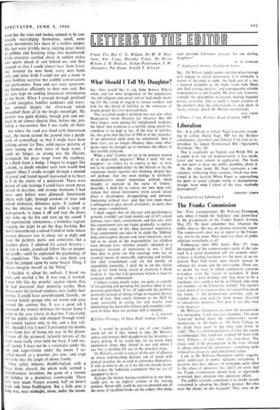The Franks Commission SIR,—Your correspondent, Mr Williams-Thonsprien, asks where I
found the 'ballyhoo' and 'gimmickry' in the presentation of the Franks Report (Letters, May 27). He must remember that, whatever the public interest, this was an internal university report. The commission's duty was to report to the Univer- sity, not to the press. What need was there of public relations consultants at all?
'Embargoed until 0001 hours May 12'; large photographs of the commissioners (quite of the type used in a 'good promotion job' for popular enter- tainers); a briefing luncheon for the press in an ex- pensive West End hotel, were merely devices to enhance the drama and the news-value. These are, no doubt, the ways in which commercial concerns nowadays court the favour of newsmen. If there had to be a press briefing, why had there to be a luncheon; why could it not be in Oxford; why were not members of the University invited? The report's break-down of its expenses does not reveal how much the lunch, or the promotional activities, cost, or whether they were paid for from money allocated to educational purposes. Nor does it say why they were necessary.
Mr Williams-Thompson asks how the presentation was misleading. I will give two examples. The press 'hand-out' boiled down the commission's recom- mendations on All Souls to 'All Souls College to be given three years to put their own house in order.' This is a misinterpretation of what the report recommended. The 'hand-out' credited All Souls with forty Fellrs; in fact there are sixty-three. The whole tone of the presentation, in the ways alluded to above, enhanced the sensational—something quite inimical to university and educational values.
I am. as Mr Williams-Thompson rightly suggests, quite uninitiated in public relations procedures. I perceive that they operate on principles quite alien to the ethics, of university life. and I am sorry that the Franks Commission should have so vigorously promoted their intrusion into university affairs.
The public relations consultant is no doubt mainly concerned to advertise his client's product. But who were the Clients on this occasion? They were an in-
terml university commission. What need had they for advertisement? Publicity can assist public opinion to crystallise, but equally democratic discussion can be compromised because opinion has been artificially created by extensive propaganda.
BRYAN WILSON
All Souls College, Oxford



































 Previous page
Previous page